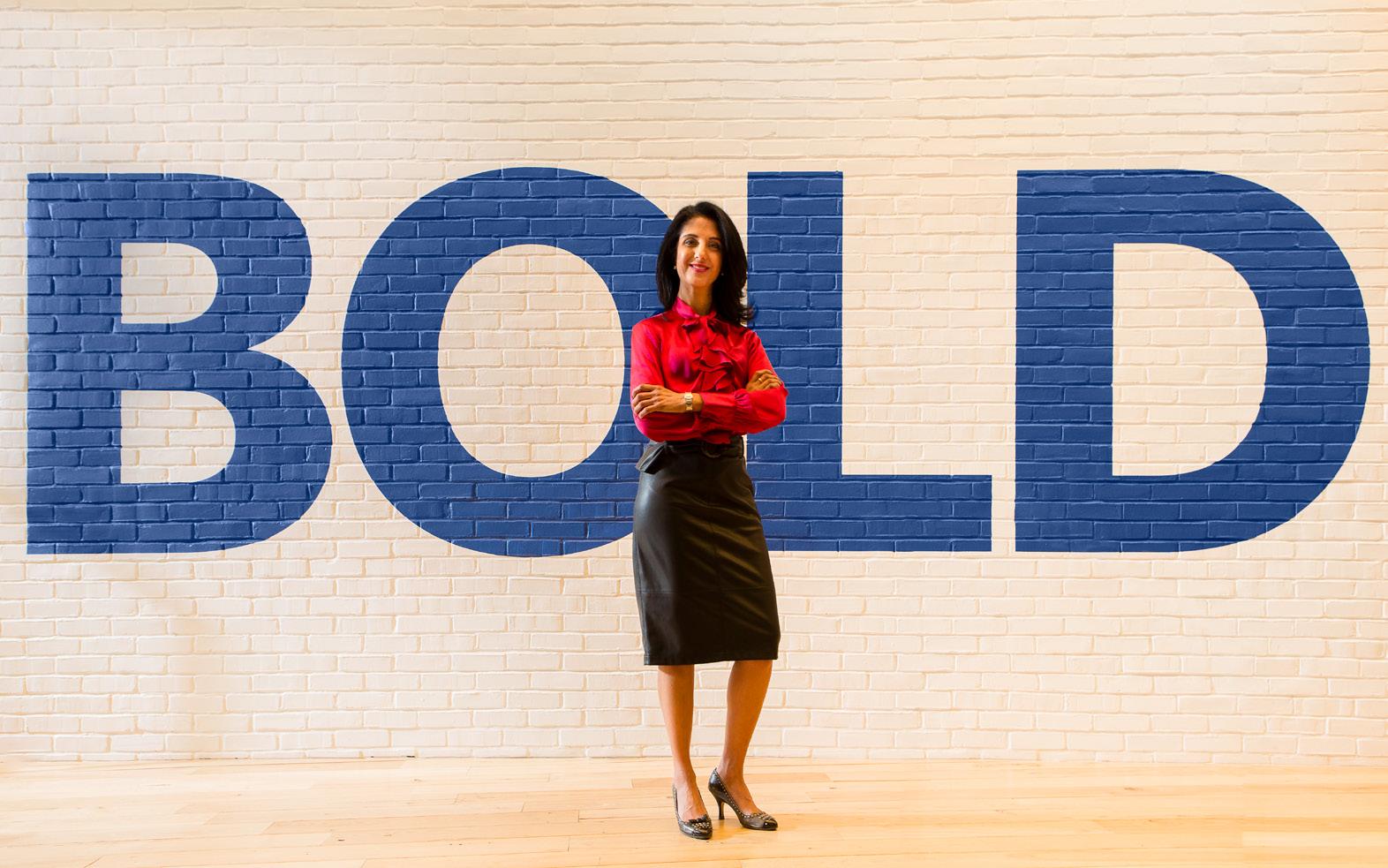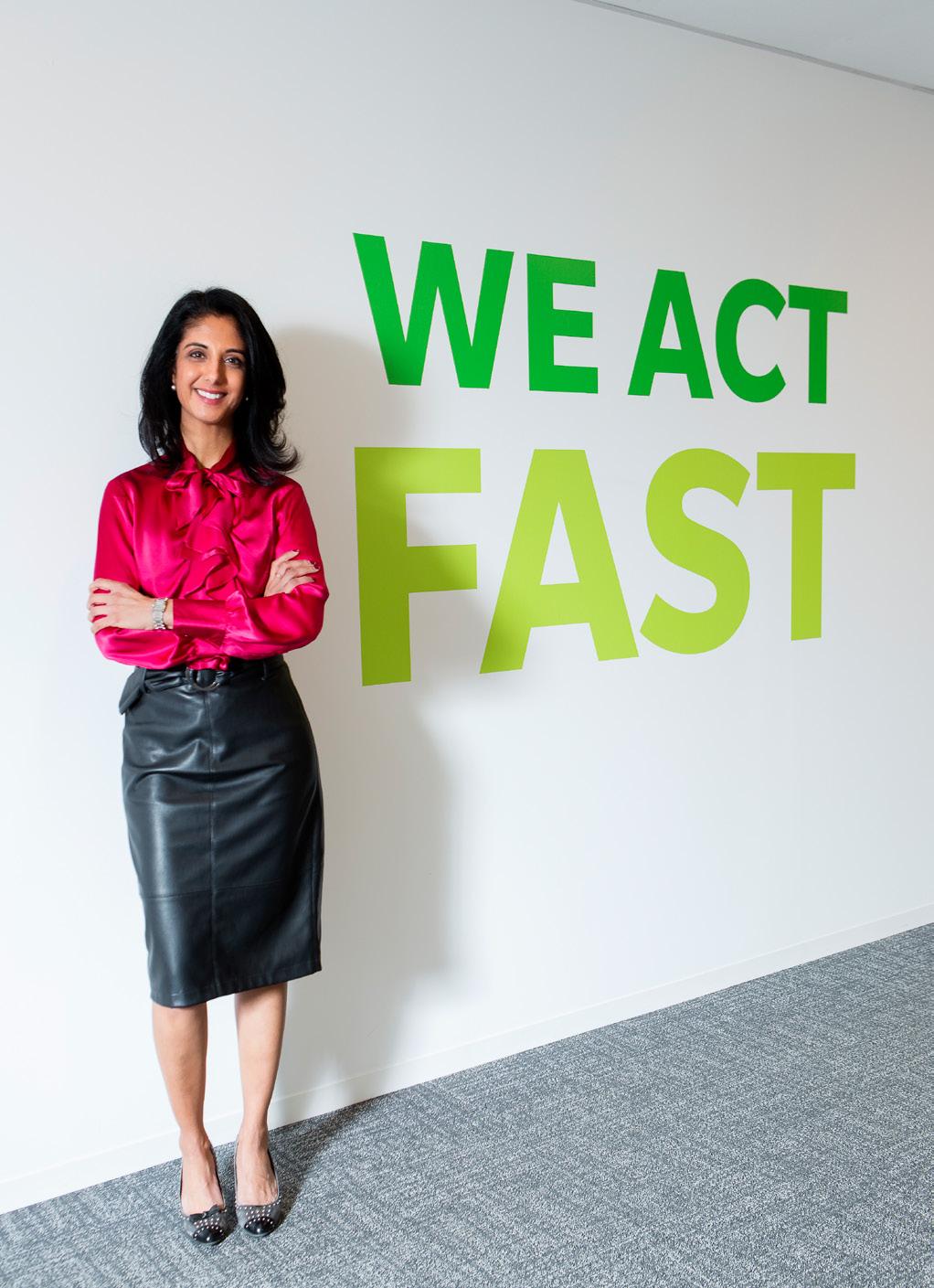
9 minute read
Chief Chaos Officer
Allergan’s head of talent, Soni Basi, helps employees chart their future in a company that is in a constant state of change.
BY SARAH FISTER GALE
Advertisement
Soni Basi is no stranger to disruption. Throughout her career, the current executive director of global talent for Allergan has worked through multiple mergers and acquisitions, shepherding thousands of employees through massive cultural and structural change as their companies and teams were merged or dissolved.
After holding a talent leadership role at the global pharmaceutical company Schering-Plough (now part of Merck), which went through two major acquisitions in three years, she spent six years at the Estee Lauder Cos. “I liked that their brand focus was on creating confidence,” said Basi, who has a doctorate in social psychology from Bowling Green State University.
She also loved that at the time Estee Lauder was a greenfield environment for talent development. When she joined the company in 2011, there was little formal structure around talent development and performance management. “It was ripe for innovation,” she said. In her time there she built multiple global talent programs to support the company’s 40,000 employees and took charge of global onboarding, career development, learning and development, and other talent management programs. “My team made a significant impact and met many of the objectives of the CEO,” she said. She was happy at Estee Lauder, but in 2016, she heard that Allergan, a global pharmaceutical company headquartered in Ireland, had gone through a failed $160 billion merger with Pfizer. A former colleague from Schering-Plough, Karen Ling, was the chief human resources officer of Allergan at the time, and Basi reached out to ask if she could do anything to help them cope.
Ling’s response: Come work for us. “We had been looking for a head of talent for a while, and Soni had a great reputation,” said Ling, who is now CHRO for
American International Group. “I wanted someone like her on my team.” Ling especially liked Basi’s analytical approach to HR. “She understands the science of HR, and she’s great with numbers,” Ling said. “She is also practical in her approach.” “People build careers by making courageous moves. Nothing is reliant on holding one specific role anymore.” — Soni Basi, global talent leader, Allergan
Basi in turn appreciated Allergan’s combined focus on pharma and beauty products, which felt like a natural fit given her past jobs. She also liked that because the Pfizer deal fell through, Allergan was in a position to build its own talent processes from scratch. “It was a blank slate, which is a great way to enter an organization,” Basi said. So, she took the job.
Change Is the Only Constant
Basi’s experience managing employees in the aftermath of mergers and acquisitions was perfectly suited to Allergan’s needs. The $15.79 billion company was built as the result of many rapid product and business acquisitions made over the course of just a few years. These included five company acquisitions in 2015 and another eight in 2016.
The rapid rate of growth through acquisition meant projects and teams were changing constantly, with roles coming and going as needs arose and positions evolving to accommodate new products, skills and market changes.
“It was all very good for the stock price and bottom-line, but the question was how to bring together all of those different cultural perspectives,
32 processes and procedures,” said Jon Green, a partner with Deloitte Consulting’s Human Capital Practices, who worked with Basi on Allergan’s talent transformation. “Allergan had to decide who it was going to be,” he said.
That’s where Basi came in. Early employee surveys showed Allergan employees didn’t understand the career paths in the company and wanted a tool to help them chart their future in the new environment. However, Basi recognized that because the company culture was built around a constant pace of change, she couldn’t follow a traditional approach of mapping careers based on structured moves from one role to the next. So, she and her team came up with a more flexible solution and called it My Allergan Career.
My Allergan Career is an adaptable career path planning tool for all of Allergan’s roughly 17,000 employees based on the skills that employees need to move up in the organization rather than defining precise career paths for every position. “There is no one pathway to success at Allergan,” explained Mitra Agcaoili, executive director of talent management and acquisition at Allergan. “So instead of defining specific roles, we looked at the skills people needed to do well in those roles.”
By defining ideal combinations of skills and linking them to various roles, employees can figure out which skills they already have, what skills they still need, and what roles, learning programs and stretch assignments they should pursue to close the gaps. They also decided to align compensation with skill development rather than positions. This ensures employees can pursue lateral or even lower-level roles that will help them develop desirable skills without sacrificing pay. “It shows that we back our careers philosophy with our compensation philosophy,” Basi said. Career Mapping Through Storytelling
To create the tool, Basi and her team interviewed hundreds of leaders in “representative roles” from across the company. In these interviews, which they captured on video, the leaders talked about their career stories, the opportunities they had that helped them climb the corporate ladder and the skills that have helped them to be successful in these roles. Using these stories, Basi’s team mapped the skills needed for hundreds of different careers throughout the organization.
The tool lets employees see what skills they need to land different roles and to create their own career paths to get to where they want to go. “We showed people what they needed to do to succeed but said, ‘the path you choose is your own,’” Agcaoili said. By providing employees with this flexible career development option, Basi’s team hopes to improve their employee experience while fostering more career mobility within the organization.
Basi noted that many of the most impactful moments from the interviews were not the lists of experiences and job titles, but the interactions these leaders had with peers and mentors. “They told stories about when they felt uncertain about themselves until someone believed in them,” she said. “The storytelling was the biggest component of the project.” These moments demonstrate the importance of networking and helped her communicate the value of taking lateral positions to learn new skills. “People “Instead of defining specific roles, we looked at the skills people needed to do well in those roles.” — Mitra Agcaoili, executive director, talent management and acquisition, Allergan Soni Basi, global talent leader at Allergan, worked with her team to implement a career path planning tool for the company’s 17,000 employees, helping them realize which skills they had and which skills they would need for desired roles.

build careers by making courageous moves,” Basi said. “Nothing is reliant on holding one specific role anymore.”
The project took months to complete and required significant financial support from the executive team — though Basi was able to pull it off. “She was great at getting leaders to collaborate on that project,” Ling said.
Basi’s appeal was that she never forced anyone to participate. Instead, she shared her vision for the tool and explained how their stories could help other Allergan employees follow in their footsteps. Then she asked for their feedback on the project and used what they shared to make it better. “Even though all of the leaders are overworked, they all made time for her because she inspired and motivated them,” Ling said. “They saw how their stories would benefit others.” That grassroots support helped Basi get the resources she needed to build the program and generate buy-in for it across the company. “She put herself out there and dealt with any push-back that came,” Green said. When she faced doubters, Basi educated them on the value it would bring to employee engagement, leadership development and talent management. “She made it stick,” Green said. When her team launched My Allergan Careers in April 2019, employees immediately loved it, according to Agcaoili. “It did more than just provide a road map.” The tool made it easier for employees to reach out to leaders whose career stories they’d seen, to ask for advice and possible mentoring. “It’s become the new norm around here,” she said. “It shifted the mindset of who you can talk to about your future.”
Tell Me About Yourself
While My Allergan Career is one of the biggest initiatives Basi has undertaken since joining the Allergan team, it’s one of many efforts she’s led.
She’s also proud of a series of new training programs she deployed in 2019 to help Allergan employees tell their own career stories. The program, called Pitch Perfect, includes a course on how to talk about yourself internally, how to talk about yourself on LinkedIn and how to be more inclusive in your language.
This program is also tied to Allergan’s history of acquisitions. So many employees are new to the company, and going through changes in their teams and roles, they needed a way to promote themselves for new opportunities, Basi explained.
Pitch Perfect was originally a simple idea in response to the constant pace of change, but as soon as she launched it she knew she’d tapped into a serious unmet need. “Right away we had 500 people on the waiting list,” she said. “There was so much interest, it was clearly something people wanted.”
Basi prepares her people to thrive in constantly changing workplace environments.

The courses cover how people present themselves, how they tell the story of themselves and how they should answer questions about their work experience in a way that demonstrates their value. Basi was surprised at how challenging that could be for some people. “When you ask them what sets them apart, they don’t know how to answer,” she said. Many learners would give a list of titles or projects rather than showcasing what they accomplished in those roles.
She loves to see their reaction when she helps them shift their narrative. “They see how they add value for the organization,” she said. “It has been very meaningful.”
The Next Acquisition
These new communication skills will likely come in handy in the coming year. In October 2019, Allergan shareholders approved a $63 billion acquisition by AbbVie, the U.S. biopharmaceutical company that spun off from Abbott Laboratories in 2013.
This means Allergan employees are facing yet another giant shake-up.
Fortunately, Basi has been preparing them to thrive in a constantly changing workplace environment. “I don’t know what the future holds with AbbVie,” she said. “But I want to give our people a solid set of tools and resources that will help them through these times of change.” CLO





